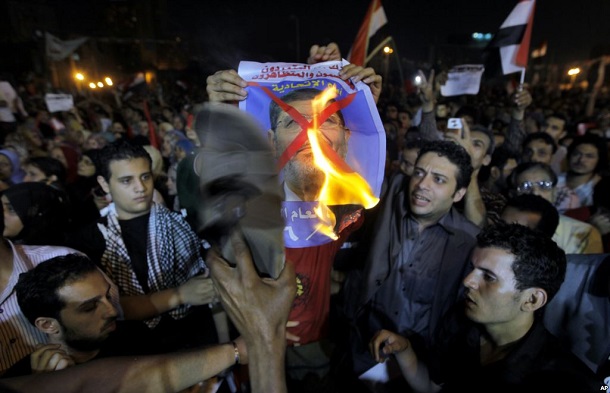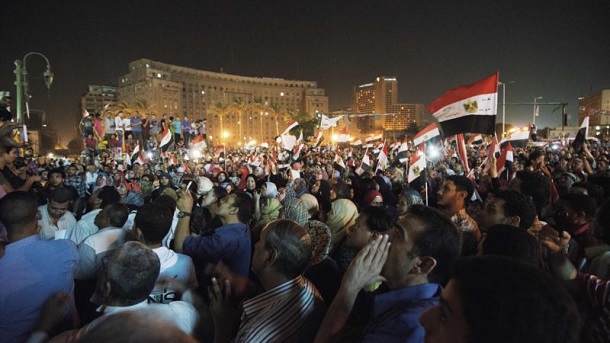Increased pressure from the islamic government in Egypt and the growing anti-government protests President Morsi blame foreign force like any other islamic dictators.
Egypt is in for a new series of protests with supporters and opponents of President Morsi set to gather in Cairo. Many of them, including advocates of Islamic ideas, feel disappointed by the economic slump, blaming the government.
President Morsi’s supporters and opponents plan their rallies on Friday, while the wider opposition coalition is also expected to bring millions out on Sunday, calling for new elections.
“We are confident the Egyptian masses will go out in their millions in Egypt’s squares and streets on June 30 to confirm their will to get the January 25 revolution back on track,” the liberal opposition coalition said.
RT’s correspondent in Egypt Bel Trew reported that “the country is worried that there will be further violence after several days of clashes between rival groups, demonstrating either in support of the president or against him.”
In the light of the rallies, local residents have been withdrawing cash, queuing outside petrol stations and stocking up on food, according to AFP. Many companies said they would close on the first day of the working week in Egypt, Sunday, when the large-scale opposition rally is due to take place.
The army, which helped protesters overthrow previous President Hosni Mubarak, has warned that it could step back in to impose order should violence spin out of control.
“Protest comes amidst a growing security crisis across the country. We’ve already seen several people die, hundreds injured in the days leading up to the protests. We’re seeing an increase of civilians armed and bringing those weapons to protests which has led many to call for the army to step in and secure the nation,” Bel Trew added.
Earlier this week one man was shot dead and four wounded in an attack on a provincial party office, Egypt’s ruling Muslim Brotherhood said. The incident, which took place north of Cairo, raised the death toll to five in factional fighting that also left many injured over the past week, with fears of wider violence during the upcoming protests, two years after the Arab Spring revolution that ousted Mubarak.
The Arab world’s most influential and one of the largest Islamic movements, the Muslim Brotherhood, has slammed activists campaigning to force the fifth president of Egypt, 61-year-old Morsi, to resign as he celebrates his first year in office.
On Thursday, the opposition National Salvation Front coalition refused Morsi’s offer to cooperate on reforms to end a political deadlock that has driven the biggest Arab nation into economic crisis, and called instead for an early presidential election.
Morsi’s critics primarily see him as a Muslim Brotherhood delegate, appointing Islamists in key positions, returning Egypt to authoritarianism.
“I think it goes without saying, and Morsi himself has partially admitted it, that he has disappointed people. As far as those people who helped to bring Mubarak down or a sizable section of them he’s changed absolutely nothing since he came to power and these protests are to show that the democratic fig leaf is not enough. So what will happen on Sunday will be quite decisive,” author and journalist Tariq Ali told RT.
Ali says Egypt is divided between those who seek an evolution towards democracy, and those who are still in the mind-set of the old regime.
“It’s not the case that he [Morsi] is bereft of support, it’s just that the country is now very sharply divided between those who want some meaningful change and he government which is maintaining continuity with the previous regime and in some instances getting worse.”
Morsi’s Islamist supporters emphasize that he derives his authority from the first free presidential election in Egypt’s history, and that the challenges he faces, namely corrupt and inefficient institutions, economic woes and religious strife have all been inherited.
In a televised speech on Wednesday, Morsi warned that political polarization threatened to “paralyze”Egypt.
He has also admitted making mistakes and pledged to correct them.
“I have made many mistakes, there is no question. Mistakes can happen, but they need to be corrected,” he said.
Morsi threatened legal action against several prominent figures, claiming some judges were obstructing him, and accused liberal media owners of bias.
Shortly afterwards, he publicly accused the owner of CBC television of tax evasion, Mohamed Amin found he was barred from leaving the country. “This is dictatorship,” his lawyer told Reuters.
Officials also ordered the arrest of a talk show host on another channel and the station to be shut down for inciting mutiny in the army and for insulting the armed forces and the police.
Last week, tens of thousands of Islamists got together, chanting for Morsi and Islamic law, calling the turnout proof that he enjoys mass support and accusing the opposition of being remnants of Mubarak’s regime.
[adrotate banner=”64″]



